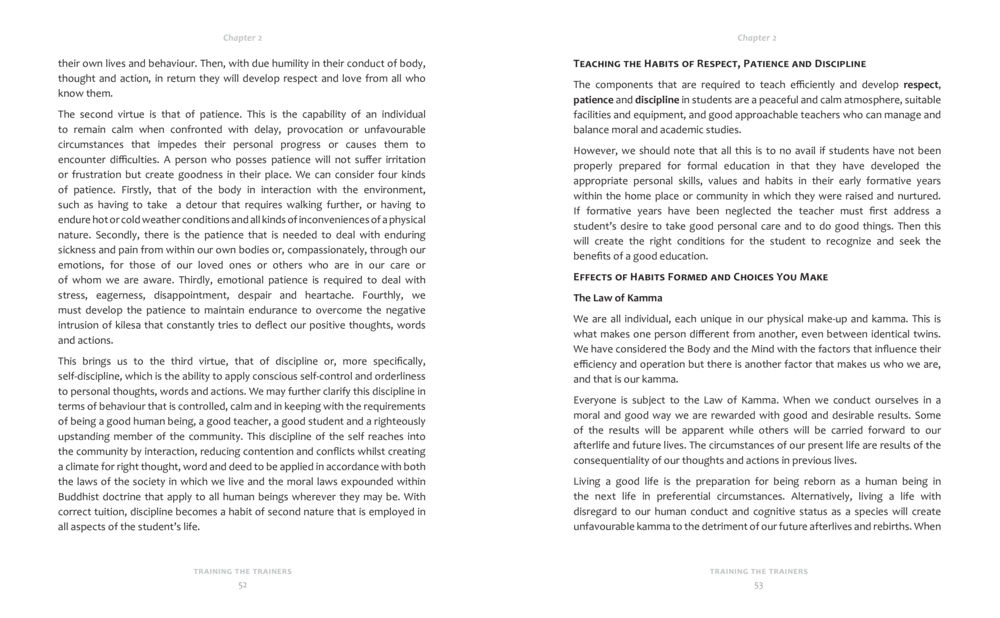Teaching Respect, Patience, and Discipline in Education : หน้า 27/47
Training the trainer part 1 : หน้า 27/47 Explore the essential components to instill respect, patience, and discipline in students, focusing on early formative years and the impact of personal habits.
0 ครั้ง

สรุปเนื้อหา
การสอนความเคารพ ความอดทน และวินัยในนักเรียนต้องอาศัยบรรยากาศที่สงบและเหมาะสม รวมถึงครูที่เข้าใจเด็กและสนับสนุนการเรียนรู้ แต่หากนักเรียนไม่ได้รับการเตรียมตัวในวัยเด็กก็จะเป็นอุปสรรคต่อการเรียนรู้ที่ดี การมีกิจกรรมเชิงบวกและสร้างนิสัยที่ดีในช่วงเริ่มต้นจะช่วยกระตุ้นให้มีความต้องการในการเรียนรู้เพื่อพัฒนาตนเอง การตระหนักถึงกฎแห่งกรรมทำให้รู้ว่าการกระทำที่ดีจะส่งผลดีในภายหลัง ทั้งในชีวิตนี้และในชีวิตหน้า นักเรียนควรเข้าใจผลของการกระทำในอดีต และทำให้เขาเข้าใจถึงความสำคัญของการใช้ชีวิตอย่างมีคุณธรรม.
หัวข้อประเด็น
-Importance of Early Education
-Components of Effective Teaching
-Law of Kamma
-Impact of Personal Habits
-Strategies for Teachers
ข้อความต้นฉบับในหน้า
TEACHING THE HABITS OF RESPECT, PATIENCE AND DISCIPLINE
The components that are required to teach efficiently and develop respect,
patience and discipline in students are a peaceful and calm atmosphere, suitable
facilities and equipment, and good approachable teachers who can manage and
balance moral and academic studies.
However, we should note that all this is to no avail if students have not been
properly prepared for formal education in that they have developed the
appropriate personal skills, values and habits in their early formative years
within the home place or community in which they were raised and nurtured.
If formative years have been neglected the teacher must first address a
student's desire to take good personal care and to do good things. Then this
will create the right conditions for the student to recognize and seek the
benefits of a good education.
EFFECTS OF HABITS FORMED AND CHOICES YOU MAKE
The Law of Kamma
We are all individual, each unique in our physical make-up and kamma. This is
what makes one person different from another, even between identical twins.
We have comebody and the Mind with the factors that influence their
efficiency and operation but there is another factor that makes us who we are,
and that is our kamma.
Everyone is subject to the Law of Kamma. When we conduct ourselves in a
moral and good way we are rewarded with good and desirable results. Some
of the results will be apparent while others will be carried forward to our
afterlife and future lives. The circumstances of our present life are results of the
consequentiality of our thoughts and actions in previous lives.
Living a good life is the preparation for being reborn as a human being in
the next life in preferential circumstances. Alternatively, living a life with
disregard to our human conduct and cognitive status as a species will create
unfavourable kamma to the detriment of our future alternatives and rebirths. When
TRAINING THE TRAINERS
52
53
หน้าหนังสือทั้งหมด
หนังสือที่เกี่ยวข้อง
Load More















































